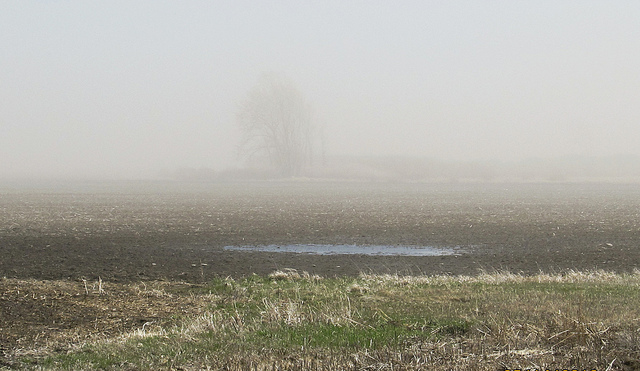This is something to behold. A more-or-less hurricane in early July. Has anyone ever seen such a thing?
This is climate change, and it’s getting worse. And whereas the news of the day is about people with the power out, the long-term story is about the hit to agriculture, now and in future, here and worldwide — keeping in mind that farming is more than an “economic sector.” It’s the food supply.
A Kings County farmer, counting up his losses, was quoted in Wednesday’s paper, saying “it won’t put us out of business. I’ll just be more cynical next year.” More cynical presumably means some agonized thinking about not only what to plant and how to plant it, but how to shield it from the increasing hazards of climate mayhem. The incentive for him, ominous as it is for the rest of us, is that food prices will keep rising.
This is the story all over, as agriculture, always up and down, has become a wild, unpredictable ride through floods, droughts, storms, killing heatwaves, heat-related pest infestations and other hazards. In some places — drought-ridden California being the prime example — the scary question is whether agriculture there is simply finished for good.
In some places, the changes can be beneficial, at least temporarily. Consider what happened on the Prairies last year. Whether linked to global warming or not, there was so much grain that the rail system couldn’t handle it. This year, much of grain country is under water and, for many farmers, what’s left in their bins from last year’s crop will be their income for the year.
Meanwhile, food prices and associated water supply issues have become destabilizing political factors. The Western public saw only the pro-democracy part of the “Arab spring.” Agricultural economists point out that rising food prices were the real trigger for the revolutions. The slogan on Tahrir Square, one observer said, was “bread, freedom, justice,” in that order. There were food riots in 36 countries in 2008, a bad year, with the government of Haiti toppling.
There are low-grade “water wars” involving some 30 countries, says the UN — notably China damming off rivers that flow to a half dozen southeast Asian countries, including India and Bangladesh. In the Middle East the fabled Jordan River is expected to have its flow reduced by 80 per cent by the end of the century. They risk becoming shooting wars in future, with irrigation the main issue.
The standard prediction is that we’re heading for two billion more mouths to feed by 2050 (although I doubt that will ever happen), with the UN warning that present farming practices won’t get us there. Since agriculture is a big producer of greenhouse gases, expanding will merely exacerbate the problem — and on the large scale, the addition of arable land in northern Canada and Siberia thanks to warming will be offset by desertification in other parts of the world. Plus, in different parts of the world, the underground reservoirs that supply irrigation are being exhausted, heat is limiting grain production, honey bees and other pollinators are dying off mainly because we’re poisoning them with pesticides, new microbial diseases linked to heat are appearing, and there’s accelerated soil erosion and loss of fertility.
What to do? As with our pollution-based economy generally, the answer is one we and our established systems resist ferociously: to change our ways. The experts point out that a third to half of food is actually wasted and mere increased efficiency, especially energy efficiency, in the food system — from the farm to us — would work wonders. Only 43 per cent of the world’s grains are consumed directly by humans. The same applies to the other part of the food system, fisheries. A staggering figure in that regard is this: of the 110 to 130 million tonnes of fish caught worldwide annually, 30 million tonnes is discarded at sea — the same amount as goes to fishmeal to feed farmed fish. Is this as impossible to change as it seems?
According to the experts at the University of Minnesota, a notable centre for agri-philosophers, growing more crops does not equal more food to the world since large amounts of grain are calamitously diverted to make biofuels, and even more go to livestock where food efficiency is much diminished. This evokes another painful necessity if we are to avoid the worst: change of diet. Less meat, more veggies, while agricultural waste replaces grain as much as possible as livestock feed.
So the problem is not just for farmers — it’s one for the entire food chain, including the rest of us.
Meanwhile, observing my broccoli plants ripped right out of the ground, my flattened corn and other stuff beaten up, I’ll have to be more “cynical” myself next year. Hopefully it will work.
Ralph Surette is a freelance journalist in Yarmouth County. This column was first published in the Chronicle Herald.
Photo: USDAgov/flickr




